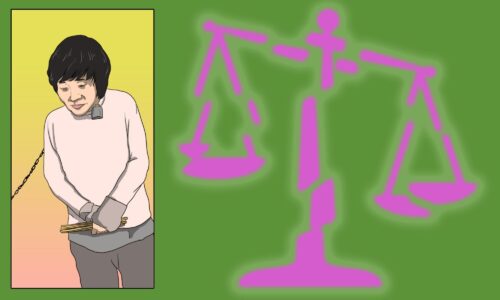Domestic violence in China and the limitations of law

China’s Domestic Violence Law of 2016 was celebrated as a victory for women’s rights. But two years later, its shortcomings are evident.
Here’s how it can be fixed.

Wang Yimei thought of her two children when she was slapped in the face and pushed down the stairs. She thought of them when she questioned if this would be the time he would kill her. But she thought of them most on the day she finally left her husband, hoping to provide a home for them free from intimidation, violence, and fear. She was devastated, then, when she reached their grandparents’ home only to hear her mother urge her to stick it out. “Are you thinking of your children,” she chided, “as you break up your family? Just stay, eventually he will grow too old to beat you. That’s what happened with your father.” Wang returned to her husband.
Ah Lian was already a survivor by the time she was ready to report her trauma to police, as she relayed to Sixth Tone. As a 23-year-old, she had already survived a man who beat her, cut her off from her family, and raped her. She clutched at one of the few options available to her: applying for a restraining order. At that time, this was an option offered by the newly implemented national Domestic Violence Law, but the police officers at her local station didn’t understand her pleas for help and told her to “just work it out.”
Domestic violence is tragically universal, cutting across ethnicity and nationality. Globally, one in four women experience it. The major difference across borders is not the characteristics of the abuse, but the laws and protections in place to respond to and protect the victims. In China, the trend is much the same, with an All-China Women’s Federation and National Statistical Bureau study in 2010 finding that 24.7 percent of Chinese experience domestic violence in their lifetime.
The sad reality is that China is late to offer legal protections to victims of domestic abuse. While the U.S. passed its first anti-domestic violence law in 1994, until two years ago, there was no national legislation with the term “domestic violence” in China, and there are still no laws prohibiting marital rape or sexual harassment. As a result of low legal and social awareness, police officers, judges, the general public, and victims themselves struggle to identify domestic violence as an act that warrants outside involvement. As a result, women like Ah Lian and Wang Yimei (both pseudonyms) are either hesitant to report or face tremendous resistance after doing so. The barriers to combating domestic violence are in part cultural, but they require strong legislation to thoroughly break through.
The 2016 Domestic Violence Law (反家庭暴力法 fǎn jiātíng bàolì fǎ) sought to create new protections for victims through comprehensive legal procedures, mainly protection orders (similar to restraining orders) and a written warning system that mandates early intervention from employers, government officials, social workers, and law enforcement. The law’s passage marked a landmark achievement for China’s women’s rights activists, who had been pushing for such domestic violence legislation for two decades; along the way there were high-profile protests — e.g., the Feminist Five and their bloody wedding dresses — and one particularly high-profile case, that of Kim Lee, who won a court decision against her abusive husband.
But two years on, the Domestic Violence Law is largely ineffective, creating barriers at every step, from evidence-gathering (they have to do it themselves) to winning in court to seeing protection orders properly enforced. With cases that reach the court system, judges or officers are likely to pressure victims into mediation, which leaves them vulnerable to future violence.
This is assuming that victims are even aware of the law at all. “Protection orders’ greatest value could be to rural areas, where figures suggest partner violence is roughly twice as common as in cities,” Sixth Tone reports. “Yet this may be where China’s domestic violence law is failing victims most.”
The longer the law operates in the shadows, the more challenging it becomes for victims to seek support or demand intervention. The only means of keeping the Domestic Violence Law from fading into disuse is to shine a light on its areas of weakness:
1. Definitions
Domestic violence — a civil infraction, not criminal offense: Under this law, domestic violence is not a crime, but a civil infraction, essentially a violation of the contract between the government and individuals. As a civil law, penalties for convicted abusers are low. If the abuser violates the protection order, they may be fined up to 1,000 RMB (about $152), detained for up to 15 days, or face criminal charges. These penalties, of course, only apply if someone is convicted, which requires a victim to come forward, provide evidence, pay for a lawyer, endure a trial, and persevere long enough to make the system work for them. Kim Lee, who became the public face against domestic violence in 2013, articulated succinctly how these slap-on-the-wrist measures make victims feel, telling me in an email last year: “I fail to see how burning someone with cigarettes, hitting them with a bike chain, sitting on their back, and slamming their head into the floor are not criminal behaviors…financial crimes are treated so much more seriously and they have far less devastating results.”
Marital rape is still legal: China is one of 10 countries that has not criminalized rape in marriage, an issue not resolved by the Domestic Violence Law. Cultural attitudes and administrative barriers impede criminalization of rape within marriage. Domestic violence is already treated by default as a private, family matter, especially when violence intersects with sex. This makes criminalizing marital rape particularly challenging, as it would require addressing taboos including sex, sexual violence, and publicizing problems in intimate relationships. From a legal perspective, the Domestic Violence Law’s status as a civil law does not lend itself well to punishing a crime as heinous as rape, as even its harshest penalties are relatively lenient.
2. Enforcement
Poor enforcement practices: Law enforcement officials are often unwilling to enforce the law’s mandates or lack training in how to collect evidence. For example, if officers do make a record, they may write something that alludes to domestic violence but without the specificity needed to be persuasive in court. Clerical errors can have serious effects. If an officer writes “family disturbance” instead of domestic violence, it will limit the victim’s access to Domestic Violence Law protections. In order for victims to receive protection orders or file for written warnings, paperwork needs to be filed using uniformly identifiable language.
Low law enforcement awareness: Equally important is the way that officers address the accused and their families. Law enforcement lacks the awareness necessary to support victims. They may dissuade the couple from filling a report, advising them to return home and work it out with their partners.They have reportedly sent official warnings to joint residences or interviewed accuser and accused together, raising the risk of reprisals against the victim. Fixing these sloppy practices will not only improve the experience for victims, but streamline the legal process in domestic violence cases.
Over-reliance on mediation: Mediation is not a substitute for law enforcement intervention. It is, in essence, a state-sanctioned signal that victims should “just work it out.” Domestic violence is not misbehavior that can be resolved through discussion, it’s abuse that necessitates immediate intervention. “Ultimately, the success of any domestic violence law reform, notwithstanding its deficiencies, will be judged by whether victims can be kept out of harm’s way,” says legal expert Su Lin Han of the Yale China Law Center. Thus far, the law has not proven its capacity to do so.
Judicial resistance: Courts and judges are intended to be a line of defense for victims, but protection orders — the judicial system’s primary means of offering immediate sanctuary to victims — are rarely approved and largely unenforced, demonstrating the disconnect between the principles of law and the practices of those who implement it. In general, judges decline to hear protection cases or mandate mediation. In the city of Shanghai, only one-third of protection orders were approved, another third rejected, and the other resolved through mediation.
All–China Women’s Federation (ACWF) — advocate or adversary? The All-China Women’s Federation, the organization tasked with female empowerment, plays a surprisingly conflicted role in advocating for women. As a mass organization under the auspices of the Chinese Communist Party, its mandate is to first serve the party and second to represent the rights of women. Many of its employees are appointed, and may not be have willingly chosen their positions. Women cadres are often willing to help, but sometimes unable to respond with the necessary consistency or empathy. As Feng Yuan of Equality told me, bluntly, “They don’t do this job out of interest.” This poses direct problems for victims seeking protection. For example, Feng has received reports of women cadres telling victims to go back to their abusers and try to make the best of it, and then return to them if they have further issues. This response, while well-intentioned, can have the unintended consequence of making it harder for victims to leave their abuser.
The bottom line is that the Domestic Violence Law isn’t doing its job, despite the real and immediate consequences every time it fails. The issue can be quite literally a matter of life or death for some. It is unacceptable to ignore domestic violence and neglect the law designed to combat it. With sustained attention, there is greater hope for forward momentum and sustained change.





